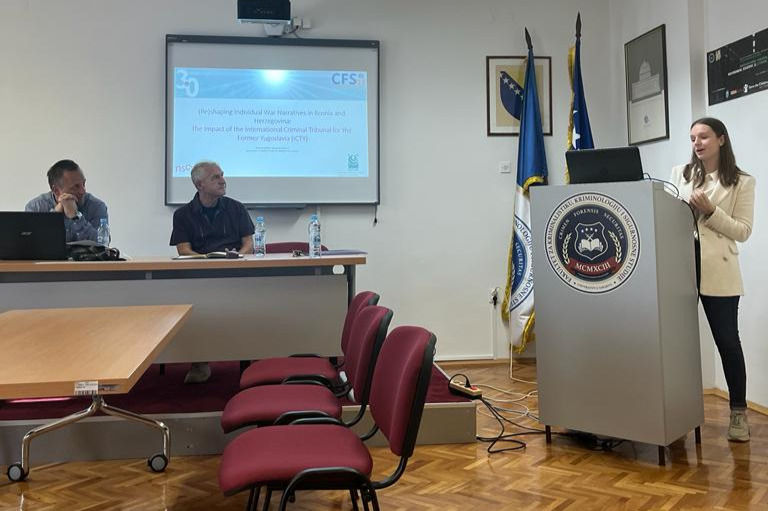
As promised, we are coming back to you with an update. While we are waiting for Lucie’s first round of data collection to finish, we want to tell you about yet another conference we participated in. This time, the conference was in Sarajevo, Bosnia and Herzegovina. Presenting (parts) of our research project in Bosnia, the country where we will be conducting a part of our fieldwork, was a great opportunity to ask respectable academics and criminologists for feedback on our work and future research steps. This is exactly what Margareta and Mirza did by presenting their work on two articles – one discussing the ICTY’s narrative of the war in Bosnia and Herzegovina, and the other on the scoping review looking into ICTY’s impact in the former Yugoslav countries. The article on the ICTY’s narrative of the Bosnian war is the first, theoretical article Margareta has been writing as a part of her research on intergenerational transmission of war narratives in Bosnia. The article is nearly done and almost ready to be submitted for publishing but you can get a sneak peak of it by reading the summary of Margareta’s presentation:
(Re)shaping Individual War Narratives in Bosnia and Herzegovina: The Impact of the International Criminal Tribunal for the Former Yugoslavia (ICTY)
Although primarily tasked with ensuring accountability for war crimes during and in the aftermath of the war in Bosnia and Herzegovina, the International Criminal Tribunal for the Former Yugoslavia (ICTY) has also played a substantial role in creating an evidence-based, historical record of wartime events. By establishing judicial facts, the ICTY produced a historical record, or a narrative, about wartime events that can be used to combat denial and prevent attempts at revisionism. Nevertheless, six years after the end of ICTY’s mandate and delivery of its last verdict in 2023, the country’s three major ethnic groups, namely, Bosniaks, Croats, and Serbs remain in conflict over the legacy of the past war while ICTY’s findings are often denied or reinterpreted to reinforce ethnic narratives about the war.
With the ultimate aim of exploring the impact of the ICTY’s war narrative on the local community in Bosnia and Herzegovina, this paper introduces a theoretical framework developed to explain possible mechanisms of narrative creation and adoption among individuals who experienced the war. By utilizing the outlined framework, the paper then discusses the ways in which ICTY can affect the process of creation and (re)shaping of individual narratives about the Bosnian war as well as possible factors that can influence it.
Mirza presented the latest on the scoping review he is conducting on a related topic. Barbora and Margareta, his co-researchers, can guarantee you the article will be a super interesting read. Stay tuned to the website to be up-to-date on all the latest developments on the review – we will be updating you on it soon! Until then, have a look at what Mirza covered in his conference presentation:
Towards an intergenerational legacy: A systematic review of attitudes towards and impacts of the International Criminal Tribunal for the former Yugoslavia
The collapse of the Socialist Federal Republic of Yugoslavia in the early 1990s led to widespread crimes, including massacres, rapes and illegal imprisonment. In order to solve the issue of impunity and ensure justice for the perpetrators, the International Criminal Tribunal for the Former Yugoslavia (ICTY) was established. Although the ICTY has played a significant role in shaping international criminal law and promoting accountability, its legacy remains complex and debated. This presentation seeks to examine empirical research on local attitudes and local impacts of the ICTY in the former Yugoslavia. Specifically, it aims to answer the question: What does empirical research tell us about these attitudes and influences? In order to achieve this goal, the presentation systematically reviews and synthesizes existing empirical research on attitudes and impacts of the ICTY. By evaluating the methodologies and data sources used in these studies, this presentation also identifies gaps in the current knowledge base. Preliminary results reveal that individuals and local communities in war-torn countries show different attitudes towards the ICTY, influenced by factors such as traumatic experiences, ethnicity, and temporality. These attitudes include aspects of legitimacy, morality, and perceived effectiveness of the ICTY. Measurable changes on the ground in Bosnia and Herzegovina, which are the result of the ICTY's interventions, are closely related to the successes and failures of the Tribunal in achieving the goals related to justice, reconciliation, historical truth, and accountability. Based on the preliminary findings, it is evident that the ICTY's influence on local attitudes and the situation on the ground in Bosnia and Herzegovina is multiple. The complexities of post-conflict peace-building, reconciliation, dealing with the past, justice, and seeking accountability require careful consideration of the ICTY's achievements and shortcomings. This presentation contributes to the understanding of local perceptions and local impacts of ICTY’s work and highlights practical implications/concerns.

Komentáře